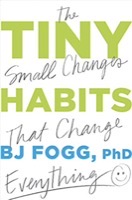Book notes: Tiny Habits
Jul 29, 2021
By BJ. Fogg
I was picking up some other self-help book from the library but this one caught my eye in the “Peak Picks” section of the local library. Checked out this one instead. He introduces a compelling behavior design model. It’s already had some effect… I find myself putting my feet on the floor in the morning and saying “It will be a great day”. :-). Although for me instead of 2 push ups after I pee, it’s hamstring stretches while I brush my teeth.
I have a few criticisms. First, he relies mostly on individual case studies, often from the same few people. Rather than cite large studies he tends to simply wave a hand at his “research” which I didn’t find references to in the book. (He may have that on his website, which he mentions often, but I didn’t look there.) Second, his delivery is overly-enthusiastic in a way that makes it feel more like a sales pitch. Lastly, a couple of stories feel unrealistically embellished (offering the kid a “yes” push button on the plane to stop kicking the back of his seat with everyone smiling and happy about it… No way. If I’m the kid I’m thinking “lame” and if I’m the parents I’m thinking “don’t interact with my kid”). However, so much of this book otherwise resonates with me that I’m very happy I read it, and highly recommend it to others.
Main takeaways:
- You change best when you feel good.
- View your behavior with curiosity, like a scientist, as a puzzle to be solved.
- Tackle behavior changes first with prompt, then ability, and only lastly with motivation, which is unreliable.
- Start a habit small. (And even practice it!)
Steps in Behavior Design: (p237)
- Clarify the aspiration.
- Explore behavior options. (Swarm of Bs.)
- Match with specific behaviors. (Focus mapping, find Golden Behaviors.)
- Start tiny.
- Find a good prompt.
- Celebrate success.
- Troubleshoot, iterate, and expand.
1. The Elements of Behavior
- B=MAP. “Behavior happens when Motivation & Ability & Prompt occur at the same time.” (p19).
2. Motivation - Focus on Matching
- Motivation monkey. Motivation can allow you to do great things but is unreliable. “Motivation is not the ticket for long term change.” (p43)
- Prefer the words “aspiration” and “outcome” instead of “goal” (too vague). (p49)
3. Ability - Easy Does it
- Think tiny, not go big or go home. (p73)
- Ability chain: time, money, physical effort, mental effort, routine. (p80)
- 3 approaches to making a behavior easier to do (p83): 1. Increase your skills. 2. Get tools and resources. 3. Make the behavior tiny.
4. Prompts - The Power of After
- “No behavior happens without a prompt.” (p97)
- Use an “Anchor” behavior to prompt a new behavior. (p109)
- “Businesses that help customers create habits will have a huge advantage over those that don’t.” (p119)
- I found myself mapping out all the possible prompts I have in a day to look for opportunities for a new habit. It’s an interesting exercise.
5. Emotions Create Habits
- Celebrate your successes. I already do this, keep it moving. :-) I can see how others would find this part cheesy.
6. Growing Your Habits from Tiny to Transformative
- Plan your habits like a garden. (p165)
- A habit will continue if you feel successful, regardless of the size of the actual success. (p173) I found that to be surprising.
- 5 “Skills of Change” that are on the “meta” side of this whole affair and probably more for those that want to be habit coaches.
- “Super fridge” concept for weight loss (p185).
7. Untangling Bad Habits: A Systematic Solution
- Master plan (p202): 1. Create new habit. 2. Stop old habit, or optionally, 3. Swap a new habit for the old.
- You are growing into a new person and leaving the old one behind. (Identity shift, p204).
8. How We Change Together
- The unit of change is the household, not the individual. (p234)
- 3 ways to change others (p234): 1. Change your own behavior. 2. Design a change in collective behavior. 3. Design a change for others that will help them change.
- Can change by leading or by ninja.
- Feedback power zone: If someone cares about a domain but is uncertain your feedback to them can have a profound impact. Use this power for good. (p248)
- Focus on helping dolphins and turtles (high motivation people) before crabs and clams. (p250)